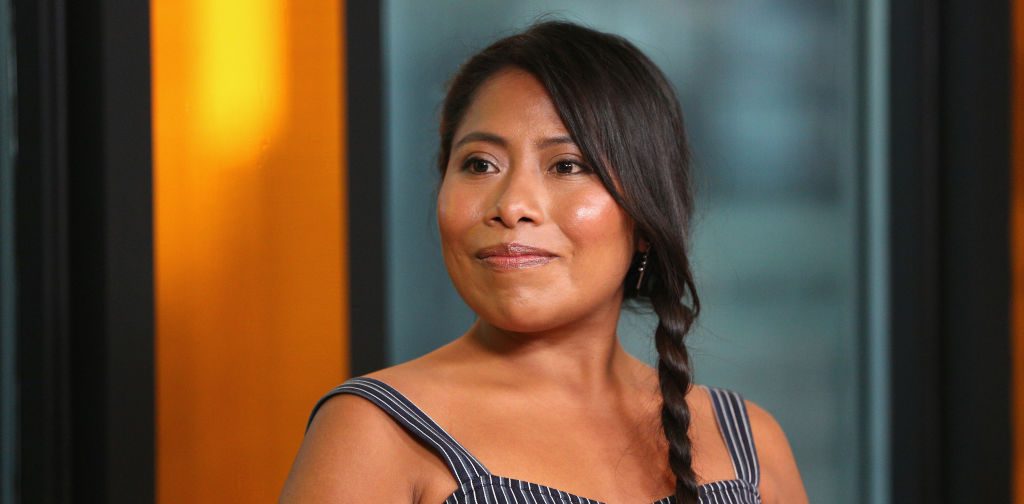On February 24, Mexican TV personality Yessica Rosales posted a photo on Instagram featuring herself and actor Claudio Herrera posing as director Alfonso Cuarón and the star of his film Roma, Yalitza Aparicio. The pic, supposedly posted from the Hollywood Walk of Fame, was promoting an upcoming episode of La Parodia, a Mexican sketch comedy series produced by Televisa. “We don’t mean to be spoilers but today we’ll win an Oscar!” Rosales wrote in Spanish to her 7,500-plus followers.
The problem? The photo in question features Rosales in brownface complete with a prosthetic nose, thick lips, and a pair of dark, full eyebrows – presumably to make herself, who is on the lighter side, look more like Yalitza.
I didn’t see her post until March 3, when a friend forwarded it to me. I had never heard of Rosales and while I was aware of the existence of the show, I had never actually watched it. But the photo really stayed with me, so I tweeted it adding a short message: “Televisa actress Yeka Rosales goes brownface to parody Yalitza Aparicio because… Televisa.”
I did not tag Rosales, nor Televisa (or anyone for that matter) but what followed was a barrage of tweets, first from Rosales’ fans and later from Rosales herself, defending her characterization by writing things like “parody knows no colors” or “being colored is a source of pride,” etc. Many of the reactions were simply ludicrous, with Rosales defending her original post saying she parodies other races and then sharing photos of herself in blackface to prove it.
I ended up muting the conversation, but the saddest part is that the whole thing was by no means new (nor shocking) to me. As someone born and raised in Mexico City, I was always intrigued (not really shocked back then) to see that people on television didn’t look at all like most people I saw on a daily basis. I mean, even the maids on telenovelas were blonde, well-coiffed, and often played by green-eyed actresses. Just try watching some Spanish-language television and you’ll be in for a parade of personalities that look like they hail from Scandinavia, whether it’s telenovela stars or Cuban-born TV hosts. Heck, even our beloved India María was a character played by a white, non-indigenous actress called María Elena Velasco.
Mocking people for being brown, poor, black, dark-skinned and using “endearing” names to describe others as inditos, negritos or chinitos is far too common – and rarely frowned upon – in Latin America. And this goes way beyond the world of show business.
Not long ago, a study commissioned by Mexico’s National Institute of Statistics and Geography (INEGI) concluded that skin color “has an influence on the level of education that people reach as well as the employment opportunities available to them.” Furthermore, Mexico’s National Council to Prevent Discrimination (CONAPRED), found that a whopping 20 percent of Mexicans “don’t feel comfortable with the color of their skin and many feel they had been discriminated against because of their physical appearance, mainly for being dark-skinned.”
Televisa’s Roma segment aired Monday night on La Parodia, featuring some of the film’s most iconic moments in parody form, starting with Rosales (as Aparicio) sweeping the floor and nagging Cuarón for walking on it while still wet. The 9-minute sketch, shot in black-and-white just like the actual film, goes on to mock other key sequences from the movie, including a scene where Cleo goes to a hotel with her boyfriend who, for some reason, confesses to being the infamous “Negro de WhatsApp.”
La parodia also pokes fun at Roma‘s beach scene where we see the family, and their beloved maid Cleo, hugging each other after a tragedy was averted in the treacherous sea of Veracruz, except this time the moving scene gets interrupted by a local vendor peddling pareos, oysters, shrimp, and parachute rides, all of this in the slapstick brand of humor that Televisa has come to be known for.
To Ms. Rosales: What’s most problematic about your characterization of Yalitza Aparicio, and the fact that neither you nor your fans want to see “what the big deal is” is that it will only make matters worse. Maybe if we had a more diverse pool of talent out there we wouldn’t have to resort to fake lips, brown makeup, or extra-large noses and eyebrows to characterize people who look different from us, because we’ll all be portrayed in the different sizes and colors that we actually come in.







